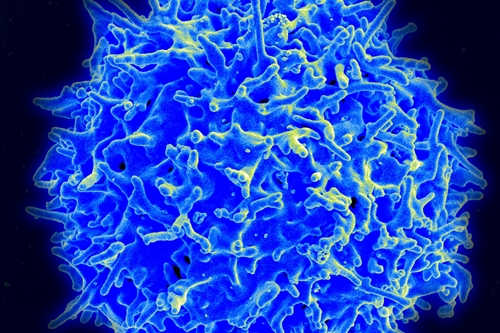
Scanning electron micrograph of a human T-cell lymphocyte (National Institute of Allergy and Infectious Diseases, NIH)
30 June 2015. Biotechnology company Juno Therapeutics Inc. and biopharmaceutical developer Celgene Corp. are collaborating on therapies that harness the immune system to treat cancer and autoimmune diseases over the next 10 years. The agreement is expected to bring Juno nearly $1 billion from Celgene in upfront payments and stock purchases.
Juno Therapeutics, headquartered in Seattle, is a two year-old spin-off enterprise from Fred Hutchinson Cancer Research Center in Seattle, Memorial Sloan-Kettering Cancer Center in New York, and Seattle Children’s Research Institute, with founding scientists from all three institutions. The company employs two technologies to encourage white blood cells in the immune system, known as T-cells, to target invading cancer cells without damaging healthy tissue. One process genetically modifies T-cells with molecules called chimeric antigen receptors to better identify and attack cancer cells on their own, without invoking immune-system signals that could target non-cancerous cells.
The second technique, known as T-cell receptors, also reprograms T-cells by adding molecules known as human leukocyte antigens that target corresponding proteins in tumors. The company harvests blood cells from cancer patients and separates their T cells for enrichment with the required genetic sequences in the cells’ DNA, then grown in the lab into dosage quantities for infusion back into the patient. In the body, the engineered T-cells multiply in the presence of target proteins and attack their corresponding tumor cells.
Under the deal Celgene — based in Summit, New Jersey — can commercialize two of Juno’s therapeutics in development to treat blood-related cancers, code-named CD19 and CD22. Both candidates are in early-stage clinical trials as treatments for acute lymphocytic leukemia, non-Hodgkin lymphoma, and other cancers of blood and lymph nodes of B-cells, white blood cells in the immune system that function separately from T-cells. Both CD19 and CD22 are based on Juno’s chimeric antigen receptor technology.
Celgene will be responsible for development and commercialization of these therapies worldwide, except for North America, where Juno retains responsibility. Celgene can also identify two other therapy candidates in Juno’s pipeline to promote worldwide, except for China, where the companies will share expenses and profits. Celgene can add a third Juno candidate to the mix, under further restrictions.
The agreement likewise gives Juno access to Celgene’s programs targeting T-cells. Celgene has experience with therapies that regulate the immune system it calls Imids, with two products — lenalidomide and pomalidomide — already approved in some jurisdictions. The deal calls for the companies to share costs and profits for developing new T-cell products, with 70 percent to Celgene and 30 percent to Juno. Celgene will lead their worldwide development and commercialization, except for the U.S. and some parts of Europe, where Juno has responsibility.
Under the agreement, Celgene provides Juno an initial payment of $150 million. In addition, Celgene is purchasing 9,137,672 Juno common stock shares at $93.00. The combination of upfront payment and equity purchases brings the total amount for Juno to $999.8 million. The deal gives Celgene the option of purchasing up to 30 percent of Juno’s shares under certain conditions, during the 10-year period.
Juno was founded in December 2013 and went public in December 2014, issuing 11 million shares at $24.00. As of 10:30 am today, its stock is trading on the Nasdaq exchange at about $55.00, giving the company a market capitalization of some $5 billion.
Read more:
- Grant Funds Exosome Cancer Research, Optioned to Spin-Off
- Spin-Off Biotech Formed for Autoimmune Disorders
- Cancer Biotech Raising $147 Million in IPO
- Bristol-Myers Squibb Licensing Gene Therapies in $2.3B Deal
- Novartis, Aduro Biotech Partner on Cancer Immunotherapy
* * *

 RSS - Posts
RSS - Posts
You must be logged in to post a comment.